In this article:
Exercise is great for the body but it causes some physiological strain. Daily exercise changes the concentrations of proteins in the body along with the way it is utilized. This is exactly why the recovery period is of great importance. (1)
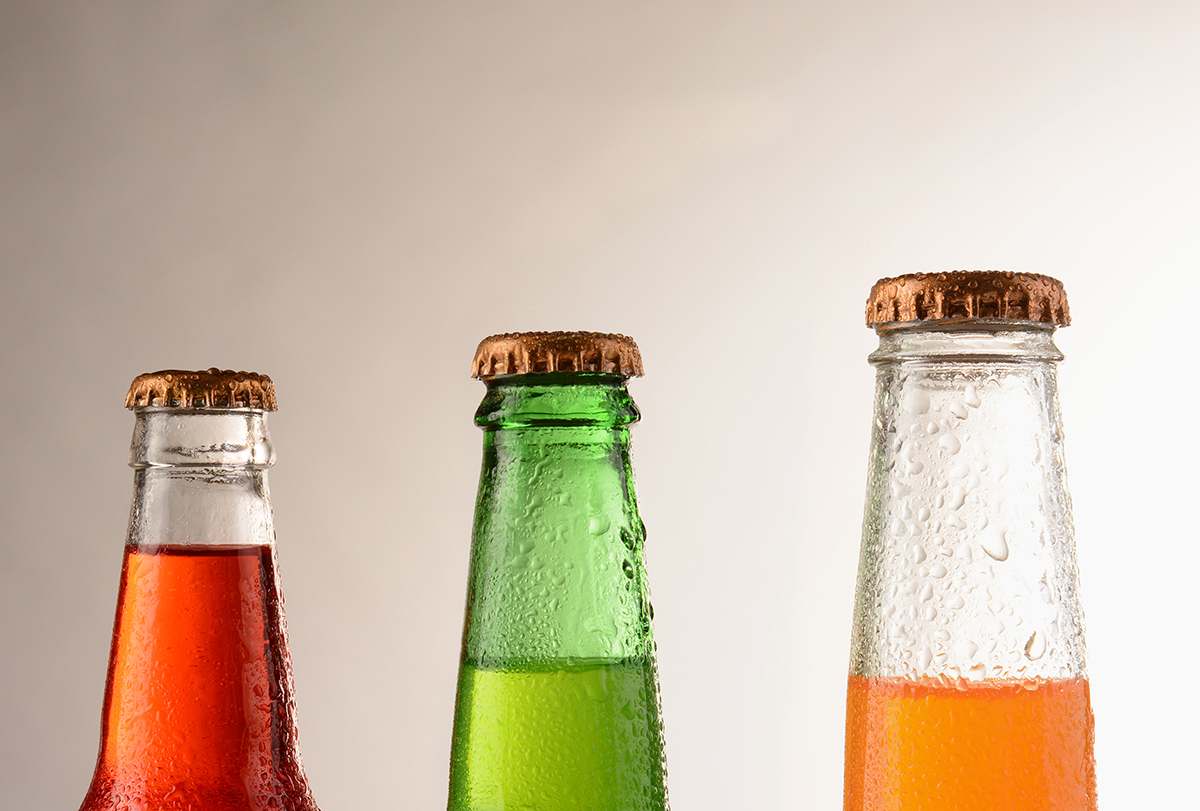
After exercise, protein requirement is considerably higher in the body. It repairs muscles that were involved and damaged in exercise. (1)
Most health bodies around the world recommended an intake of 1.2–2 g of protein/kg body weight to support the increased requirement of protein for the rebuilding of muscle. (1)
However, there is a right and wrong drink choice when it comes to post-workout drinks.
What to Not Drink After a Workout
Post-workout drinks and beverages are a trending topic, and many drinks are commercially available that promote optimum recovery after a workout. So, it is important to choose wisely and avoid the following types of drinks.
1. Soft drinks and sodas
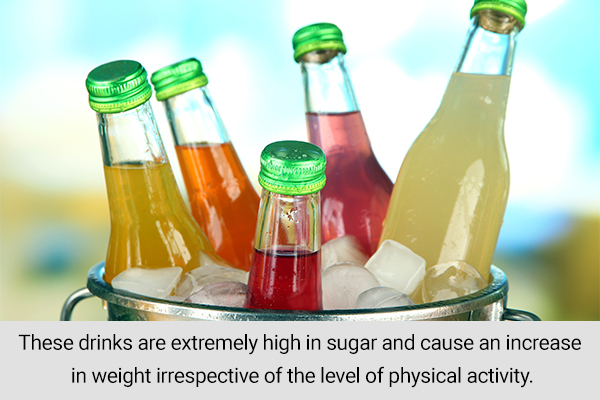
Exercise can cause a state of dehydration due to water loss through sweat. (2)
In such a case, it can be tempting to turn to carbonated beverages such as soft drinks. However, these drinks are extremely high in sugar and cause an increase in weight irrespective of the level of physical activity. (3)
A study that evaluated the effect of soft drinks as a post-workout drink found that they increased markers of kidney damage in the blood and contributed to acute kidney injury. (4)
Similar detrimental results were observed with diet sugar-free beverages, which were responsible for increasing blood sugar levels and contributed to obesity. (5)
2. Packaged protein drinks
Lately, ready-to-drink high-protein beverages have found their way onto grocery shelves. These drinks may or may not be marketed as meal replacements.
Not only do these drinks run a risk of being high in added sugar, but they also do not contribute toward a feeling of fullness or satiety. (6)
3. Packaged fruit juices
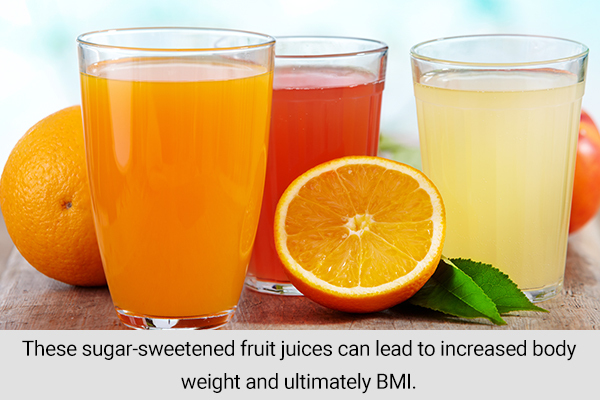
While some fruit juices, such as tart cherry juice and purple grape juice, actually contribute to muscle recovery post exercise via their antioxidant and polyphenol content, (7)(8) most packaged fruit juices are oftentimes not 100% pure juice and contain additives and lots of added sugar.
These sugar-sweetened fruit juices can lead to increased body weight and ultimately BMI. (9)
4. Sports or electrolyte drinks
You might think “sports” drinks are an obviously good choice for post-exercise recovery due to their added electrolyte content that restores fluid and electrolyte losses through sweat. They also contain optimal amounts of carbohydrates, which are needed to restore the lost glycogen from the muscles. (10)
However, studies have shown these beverages do not have beneficial effects as compared to placebo drinks without electrolytes or carbohydrates. (10)
To some extent, sports drinks can improve the dehydration status of adults, but it is important to read the nutritional information on the beverage to avoid consuming excessive added sugar. (11)
5. Alcohol
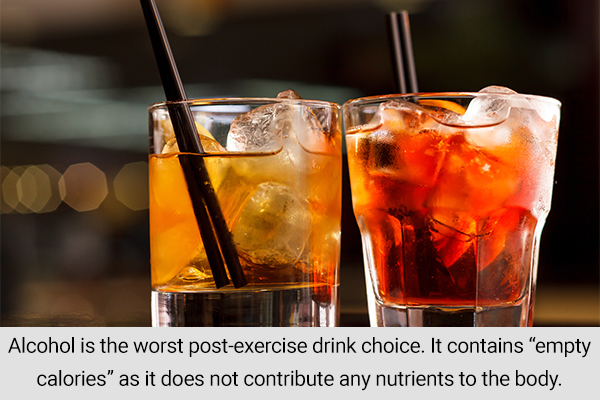
Of all the drinks discussed, alcohol is the worst post-exercise drink choice. It contains “empty calories” as it does not contribute any nutrients to the body. (12)
One study revealed that post-exercise alcohol consumption increased the levels of the stress hormone cortisol and decreased muscle recovery. (13)
In a study of athletes, consumption of alcohol after a training session reduced their rate of protein synthesis in the muscles. (14)
What to Drink After a Workout
So now that you know what to avoid, you need to know what you can consume as a post-workout beverage. Here are some options.
- Milk: High in protein and carbohydrates necessary for muscle recovery, animal milk (specifically cow) improves the repair of muscles and decreases the need for energy-rich foods. (15)
- 100% juices: Juices from fruits such as tart cherry, purple grape, blueberries, and watermelon can be effective in reducing muscle fatigue and cramps and speed up recovery after a training session. (7)(8)(16)(17)
- Electrolyte drinks: Make sure the drink has little to no added sugar, 1.2 g carbohydrate/kg body weight, 1.2–2 g/kg body of protein, and 0.3–0.7 g sodium per liter of fluid to aid recovery. (18)
Most-Asked Questions
Can I drink a smoothie post workout?
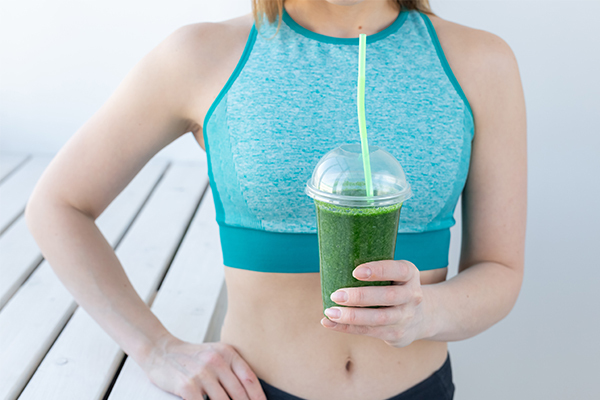
Yes! A smoothie made from yogurt or milk can be a great beverage choice. Avoid the addition of extra sugar and make use of fruits to sweeten the drink.
Can I consume protein shakes made from protein powders?
Some of these protein powders may contain flavorings, additives, and sugars. So, consult your trainer or dietitian before consuming any protein powders in drinks.
Final Word
The time after exercising is very crucial in terms of the nutrients you consume. While some beverage choices may seem ideal, they may not be so.
High-sugar beverage consumption over a long time can cause detrimental effects on health and exercise effort, especially if it was being undertaken for weight management.
Instead, choose high-protein, moderate-carbohydrate, and low-sugar beverages that will aid muscle recovery and reduce cramping and fatigue while preventing weight gain.
- Was this article helpful?
- YES, THANKS!NOT REALLY


